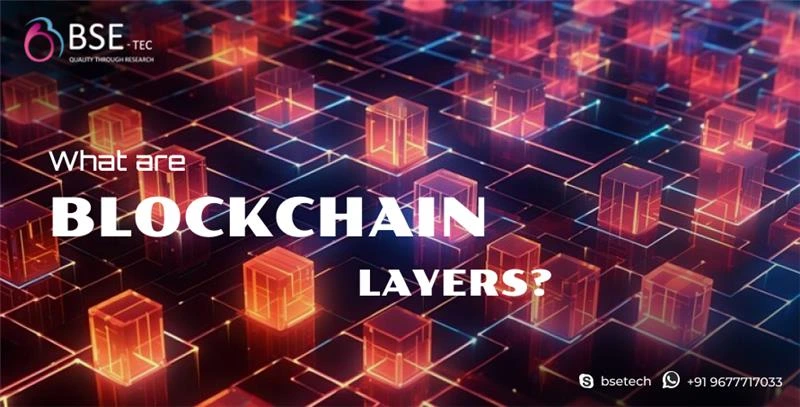What are Blockchain Layers

Blockchain technology has revolutionized the data is stored, shared, and secured. With distributed ledger design and cryptographic principles, blockchain facilitates transparency, security, and trust in various applications.
Let us explore what blockchain layers are, how the technology is structured, its technical benefits, and how development companies are adopting it.
What are Blockchain Layers
At its core, blockchain can be understood through a layered architecture, each layer serving a different purpose in the ecosystem. The most commonly recognized layers are:
Layer 0: Network Layer
This foundational layer consists of the underlying network protocol, which allows various players (nodes) to communicate within the blockchain ecosystem.
Function: It manages the routing of data packets, ensuring reliable data transmission between nodes and fostering consensus mechanisms.
Examples: Bitcoin uses the Kademlia protocol for peer discovery.
Layer 1: Protocol Layer
This is the base blockchain layer that contains the core protocol governing the network.
Function: It includes the consensus mechanism (like Proof of Work or Proof of Stake) and establishes protocol rules for transactions.
Examples: Bitcoin, Ethereum, and other base cryptocurrencies operate at this layer.
Layer 2: Scaling Solutions
Layer 2 refers to protocols built on top of Layer 1 to enhance scalability and performance.
Function: These solutions aim to handle more transactions per second while maintaining security and decentralization.
Examples: The Lightning Network for Bitcoin and Plasma or Rollups for Ethereum.
Layer 3: Application Layer
This layer comprises decentralized applications (dApps) that interact with the blockchain.
Function: It allows developers to create user-facing services and products based on blockchain technology.
Examples: DeFi platforms, NFTs, and gaming applications.
Layer 4: Presentation Layer
This layer focuses on the user interface and experience, ensuring can interact with dApps seamlessly.
Function: It includes dashboards, crypto wallets, and other user-centric tools that abstract the complexity of blockchain technology.
Examples: MetaMask, Trust Wallet, and web-based dApp interfaces.
How Is Blockchain Framed
Blockchain is framed through a combination of technical aspects and principles:
- Decentralization: Unlike traditional databases controlled by a single entity, blockchains are distributed across a network, enhancing transparency and reducing points of failure.
- Consensus Mechanisms: These are protocols that ensure all nodes agree on the data and state of the blockchain. Popular mechanisms include Proof of Work, Proof of Stake, and Delegated Proof of Stake.
- Cryptography: Blockchain uses cryptographic hashes to secure data blocks. Each block contains a unique hash of the previous block, ensuring the integrity of the entire chain.
- Immutability: Once data is added to the blockchain, altering it becomes nearly impossible due to the decentralized nature and cryptographic security, fostering trust.
Where Is Blockchain Used
Blockchain technology is versatile and can be implemented across various sectors, including:
- Finance: Facilitating cross-border payments, cryptocurrency transactions, and smart contracts in decentralized finance (DeFi).
- Supply Chain Management: Enhancing transparency and traceability of goods, ensuring authenticity, and reducing fraud.
- Healthcare: Securely sharing patient records among healthcare providers while maintaining privacy through encryption.
- Voting Systems: Enabling secure and transparent voting mechanisms that reduce electoral fraud.
- Real Estate: Using smart contracts, streamlining property transactions, title verification, and leasing processes.
How Technically Is Blockchain Useful
Enhanced Security: Due to its decentralized and cryptographically secure nature, blockchain significantly reduces the risks associated with data breaches and fraud.
Increased Transparency: All participants in the blockchain network have access to the same immutable ledger, promoting trust and accountability.
Efficiency and Cost Reduction: Automating processes through smart contracts reduces reliance on intermediaries, promoting quicker transactions and lower fees.
Data Integrity: The use of cryptographic hashes ensures that once data is recorded on the blockchain, it cannot be altered.
What does this blockchain hold
Blocks: The fundamental unit of a blockchain containing transaction data.
Chain: Sequentially linked blocks forming a continuous database.
Nodes: Participants in the network that validate and store copies of the blockchain.
Transactions: The data exchanged within blocks are verified and recorded on the blockchain.
How BSEtec Boosts Blockchain Adoption
Top Blockchain Development Companies like BSEtec specialize in Blockchain Development Services, creating custom solutions across various sectors. Their approach includes:
- Tailored Blockchain Solutions: Develop private and public blockchain solutions to meet specific business needs.
- Integration and Migration: They assist companies in integrating blockchain into their existing systems, ensuring seamless transitions.
- Focus on Scalability: By utilizing Layer 2 solutions, we ensure that their blockchain applications can handle growing transaction volumes effectively.
- Consultation and Strategy: We provide consultation services to help businesses understand and implement blockchain technology effectively.
- Focus on DApps: They develop decentralized applications that leverage blockchain’s unique features, offering clients new growth opportunities.
Conclusion
Blockchain technology, with its layered architecture, presents a myriad of opportunities across various industries. Understanding its layers, structure, uses, and technical advantages is essential for leveraging its full potential. the future of blockchain looks promising, heralding a new era of security, transparency, and efficiency.
Did you find this article useful? Let us know by leaving a comment below, or join us on Twitter and Facebook.




